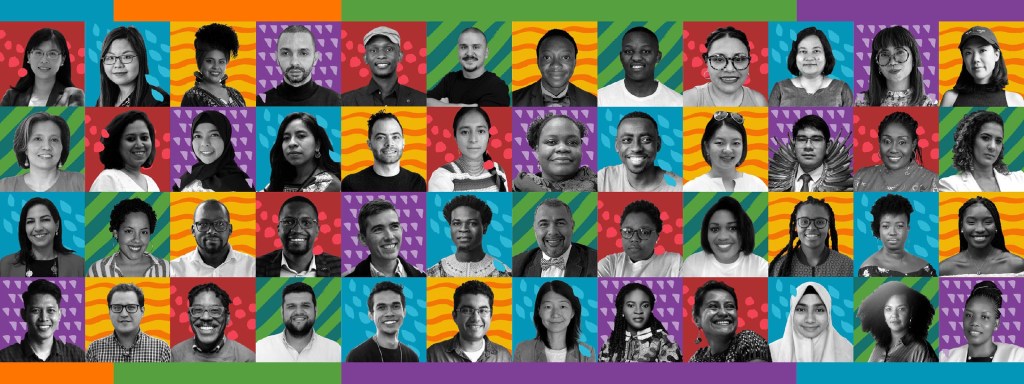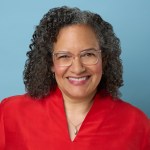
“The pandemic has created a moment of rupture and has created possibilities for leaders to disrupt existing power structures and envision an equitable future.”
-Adriana Barbosa, Ford Global Fellow
In the early months of 2020, we were getting ready to launch a new Ford Global Fellowship, a 10-year, $50-million investment to support leaders to shift structures and systems of inequality over time. The fellowship built on Ford’s long history of investing in individuals. The Global Fellowship was designed to allow fellows to travel the globe together, learning about how they each challenge and change systems that perpetuate inequality. By co-creating this community of practice, inclusive of fellows and Ford, we believe we have the potential to identify cracks in those systems and then, together, we can pry open those cracks and catalyze change and opportunity.
But then the pandemic arrived, just as we were preparing to convene the inaugural cohort. As a foundation, we had to respond to the moment and chose to cancel our plans to bring the fellows together in person. But even with the limitations on travel, we decided establishing the fellowship community virtually was even more necessary for the world—and for the leaders’ work and sustainability.
It required some creativity but, over the past 18 months, we moved our fellowship fully online, building a close knit cadre of leaders through virtual gatherings, web-based community platforms and small topical discussions with the inaugural cohort. It’s been a journey for both Ford and the fellows—the leaders have navigated these uncharted waters with us, often taking the helm and introducing us to new ideas and approaches along the way to build a fellowship unique to them and this moment in time.
This week, we are excited to welcome 48 new fellows, representing all multiple perspectives from around the world, to this growing community. The new community of Global Fellows will build on Ford’s historical investments in people who continue to grow and change the world. By investing in individuals, we pair the urgency of now with a vision for long-term social change grounded in the ideas they generate and the institutions they build.
During the past year, we tested and built on theories we’ve been honing for decades as big believers in investing in leadership. In examining these theories on what it takes to develop, support and sustain leaders, we added a sharper lens on what the fellows will gain within this new learning community right now and looking forward past this moment of rupture.
Accessibility Statement
- All videos produced by the Ford Foundation since 2020 include captions and downloadable transcripts. For videos where visuals require additional understanding, we offer audio-described versions.
- We are continuing to make videos produced prior to 2020 accessible.
- Videos from third-party sources (those not produced by the Ford Foundation) may not have captions, accessible transcripts, or audio descriptions.
- To improve accessibility beyond our site, we’ve created a free video accessibility WordPress plug-in.
What do leaders need to survive and thrive?
Leaders need spaces and pathways where their creativity can flourish and they take the lead
Individuals require both support and to be challenged to develop their skills and capacities as leaders. The Global Fellowship was intentionally created with what we called a “blank slate curriculum” in which fellows co-designed their learning spaces and pathways for inquiry into their own experiences, needs, practices and struggles as leaders. That freedom was appreciated by the fellows. I recall Chaima Bouhlel, a fellow who builds relationships with government officials to increase civic engagement in Tunisia, calling it a “a great sign of respect.”
Despite having to connect virtually, the fellows took the lead, experimenting with holding virtual conversations designed to support each other. Through story circles rooted in Indigenous models of passing knowledge down generation to generation, peer consultations for creative and collective problem-solving, and open space discussions, the fellows began to experience each others’ lives and work through story, video, and conversation. They learned how their peers are working to challenge and change inequality in their particular context.
“The fellows really get the challenges that I am facing as a leader,” said fellow Mónica Ramírez, a champion for migrant women and Latinx communities. “They are open enough to share their feelings and we have been able to both name these feelings as well as think through solutions. Sometimes it is hard to feel understood, seen and to know that people really want the best for you and your work. There is no competition or ego. It’s refreshing and so good for my soul.”
Through video calls, small and large gatherings, and web-based exchanges of their individual collages of photos, videos and more, the fellows gradually began to develop their curriculum with each other and with Ford. The fellows are challenging inequality in different ways, across different sectors. They observe and experience inequality on a local or regional scale. Then, in the context of their fellowship community, they began to bridge their particular knowledge with a broader and collective global analysis.
Listening to and learning from each other, the fellows deepened their capacity to hold each other’s perspectives and challenge sticking points—both their own and others. In time, they moved beyond giving and soliciting advice to looking at the drivers of inequality at a systemic level and imagining new possibilities for their work.
“This community is one of ‘kind challenge,’” said fellow Maria Town, president and CEO of the American Association of People with Disabilities. “We create spaces to challenge ourselves, each other and even the program staff towards our shared goal of disrupting inequality.”
Leaders need flexibility and mutual trust.
Over the years, we have observed the benefits of designing fellowship programs that maximize trust and have flexibility woven into their very bones. Flexibility allows both fellows and the foundation to adapt in real time to opportunities and challenges as they arise—and that need to adapt is more important than ever given the crises we’re facing as a world.
The Global Fellowship, like other Ford programs such as BUILD, provides resources to help bring fellows’ ideas and work to life and, in periods like this, to survive the vicissitudes of a roiling global pandemic, a tumultuous economy, local turmoil and ever-changing conditions. These funds are flexible enough to support fellows’ very survival when necessary.
Our fellowship’s combination of financial resources and a clear goal of challenging and changing inequality as the work of the fellowship has been critical for leaders, especially during this moment in time.
“For me, co-design means I still maintain my self-determination and the outcome is my own to choose,” said fellow John Muthee, who works to make health insurance more accessible across East Africa. “The Global Fellowship gives me tools and a roadmap, but the choices are up to me.”
Leaders need opportunities to design, collaborate, and iterate together.
The idea behind the Global Fellowship’s co-design process is to advance collaboration among leaders. Our aim is to connect proximate and particular leaders with all Ford has to offer, from resources to access to influence. We see our fellows as primary holders of knowledge based on their lived experiences. We also recognize Ford, as an institution, has its own knowledge to share on shifting and changing the structures of inequality.
By working together and imagining what’s possible, the fellows and the foundation’s thinking and efforts to challenge inequality in its different manifestations will expand, evolve and, hopefully, become more effective. Ours is not a fellowship based on building credentials or connections to academia. It is not focused on building specific, predetermined skills. It is built to catalyze imaginative and emergent practices for disrupting inequality.
“The Global Fellowship is the best opportunity I have to learn from my fellow leaders about how I have more options to overcome my situation,” said Davi Pereira, a fellow who works with Black rural communities and the Quílombolas who are fighting for territorial rights in Brazil. “I refuse to think I have no way out. The fellowship helps me find out how to stay, to stick in the struggle. A good leader always faces really difficult times and the fellowship gives me some light.”
Working with this inaugural cohort of fellows during this unprecedented time, co-design has been a hard and beautiful process. As program designers, we have been required to slow down and pay attention to the process—to move at the speed of virtual relationships. Building trust in virtual contexts takes a lot more time than in person! Throughout this process, our fellows have challenged outcomes the foundation initially prioritized, including the pace and rhythm of fellowship gatherings, and introduced ideas and expectations of their own to help shape the goals of the fellowship and the community we’re building.
The fellowship has helped sustain individuals through the pandemic and critical moments like the explosion in Beirut in August 2020. The fellows are developing a broader understanding of larger systems perpetuating inequality through exposure to diverse identities and perspectives from different countries, sectors and areas of expertise. For instance, fellows have identified shared experiences and synergies with policing and anti-blackness across the African diaspora, from Kenya to Brazil to the United States, and are applying this knowledge to their day-to-day work.
“This fellowship brings together local actors to solve global problems,” said fellow Tarek Zeidan, who is committed to advancing LGBTQ+ rights in the Arab world. “Global problems ignore borders. In this community, we have connected people’s minds, hearts and lived local experiences to create a whole new kind of problem solving process that is potentially more effective.”
Looking ahead
It’s been a journey, albeit a virtual one, but we are beginning to see the fruits of our shared labor. With the Global Fellows, we are co-designing an experience that demands we work together to challenge traditional power dynamics, including challenging dominant westernized worldviews about solving problems. We are building intersecting circles of leaders who are living and engaging in an interdependent world that requires all of us to pull the tide of history towards justice.
